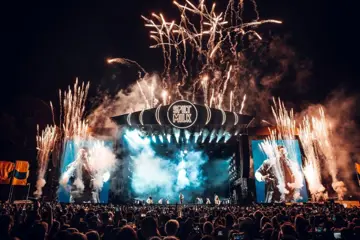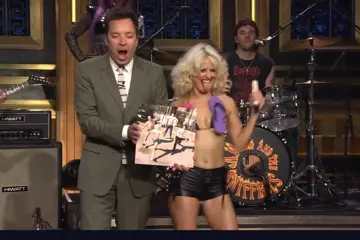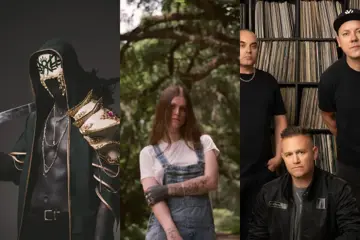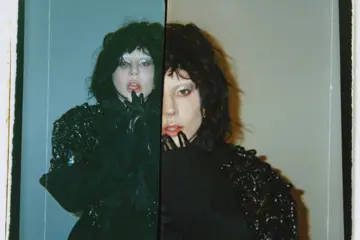The city of Detroit has played a massive role in the life of Deniz Tek. Born and raised in nearby Ann Arbor, Michigan, it was the city's vibrant late-'60s rock scene which spawned a lifelong love of music for Tek, a passion which stayed with him and heavily influenced the music he made when he moved to Sydney as a young man in the early-'70s to study medicine (he's also a practicing emergency doctor as well as a trained navy fighter pilot, but those are tales for another time).
Once ensconced in Sydney, Tek – after playing in a slew of similar bands mining the rich Detroit sound characterised by acts such as The Stooges and the MC5 – ended up slinging guitar and writing for the irrepressible Radio Birdman, in the process making an indelible mark on the Australian rock scene and heavily influencing generations of bands to come.
In breaks between Radio Birdman's operational stints, Tek has also accrued a solid catalogue of solo material – both under his own name and that of The Deniz Tek Group – and he's just released a brand new album, Detroit, a moving paean to the crumbling city which has been so influential on so much of his existence.
“I didn't know that so much of the album was going to be about Detroit when I starred recording it and started writing it, but after it was finished that was how it had turned out,” the affable musician recalls. “After looking at several name options for the album, that's the only one I could have called it really, because it relates to the city lyrically quite a bit – not a hundred per cent, but quite a bit – but then even more so sound-wise. It's pretty processed – most of the guitars are straight into an amp, then into a microphone and onto tape – there's not a lot of stuff getting in the way. That's the way music was recorded when I was a kid, and the music that I love listening to was recorded that way, so I think sonically it goes back to those old days, too.”
Detroit is also notable for Tek's assured vocal effort – the guitarist so long seen onstage in the shadow of Birdman vocalist Rob Younger – but he believes that this is merely him returning to his rock'n'roll roots.
“I'm enjoying [singing] more these days than I used to,” he smiles. “Maybe it's just the practice hours that I've put into it, or just doing it more, but I seem to be able to do it better. Back before Birdman I was a singer – I was the lead singer in a band before then called TV Jones – but since then I haven't really sung that much, but I'm becoming more interested in it again now. Again, I've had so many problems with people's availability and what they want to do – and people having their own vision, and you having your own vision, and you end up going down a middle road that isn't really satisfying for anybody with that compromise – so I just decided to go my own way for a while. If I'm able to sing those songs and it sounds okay to my ears then that's going to be good enough.
“I'm not a great singer – I sing like a guitar player sings, which is okay. I really like the singing on Johnny Winter's records and Jimi Hendrix's records, and I think that Pete Townsend is an exceptionally great singer. I think you sing differently if you sing from a guitar player's perspective, than if you're just a lead singer, period. Having said that, if I ever get the chance to work with Rob Younger again I will – he's amazing, and I'm not saying that I wouldn't go back to that if I had the chance.”
The songs Tek voices on Detroit are quite bleak, especially those relating to the titular city, which is now apparently a mere shadow of its former grand self.
“It's beyond anything you can imagine, as far as being desolate and devastated,” Tek marvels. “It's as though it got nuked back in 1967 and never got built back up. In the '67 riots, close to five-hundred businesses burned down, and a lot of neighbourhoods, and those areas were never built back up – they were never able to restore it. So you've got large areas in the central part of the city of Detroit that are just going back to wilderness – trees growing up through old shells of buildings, areas of woods with deer and beavers, there's packs of feral dogs which roam around and attack people – it's quite incredible. There's a website you can go to which compares Hiroshima with Detroit, and it shows Detroit in 1945 and Hiroshima in late-'45, and then it shows Hiroshima now and Detroit now, and Detroit now looks like Hiroshima in 1945 and Hiroshima now looks like Detroit did when it was at its peak, when it was a beautiful shining city with huge theatres and beautiful deco art on all the buildings. It's quite amazing, and I think my songs haven't exaggerated it at all.
“The other theme on the album is death, so you have the death of a city, but you also have the death of individuals. When I was writing that album it was in a time when a lot of people around me were dying – people who were very close to me – so there's that reflection of the individual loss and the loss of the city.”
If the death of a city like Detroit seems sad to an outsider, it's immeasurably poignant for someone who lived there and experienced its time as a vibrant musical mecca.
“Being there and living there we probably didn't appreciate it fully, but when you get away from it you can look back and see how great it really was,” Tek reminisces. “But it was just amazing. There was really great local bands, playing all over the place – and there were a lot of great places to play, it wasn't just pubs and clubs, there was a lot of all ages shows and ballrooms that would allow anyone to come in regardless of age, alcohol wasn't a big part of it. And in the summertime there were great outdoor concerts every Sunday afternoon, and you could see local bands – The Stooges, Bob Seger's bands, the SRC, and The MC5 would play regularly at those – and then you'd have two or three really good bands from out of time that would come, it wasn't uncommon to see Johnny Winter or Janis Joplin and people like that coming through. And if overseas bands were coming through they would play – Cream, The Yardbirds, that kind of thing. It was just amazing. There was music all over the place and it wasn't crap music – it was really good music.”
Deniz Tek will be playing the following dates:
Thursday 7 March - Plantation, Coffs Harbour NSW
Friday 8 March - Bowling Club, Lismore NSW
Saturday 9 March - Beetle Bar, Brisbane QLD
Friday 15 March - The Tote, Melbourne VIC
Saturday 16 March - The Bridge, Castlemaine VIC















